General
The 19th RUFORUM AGM in Yaoundé calls for consolidated efforts towards transforming higher agricultural & tertiary education to contribute to sustainable development & food security in Africa
Published
2 years agoon
By
Mak Editor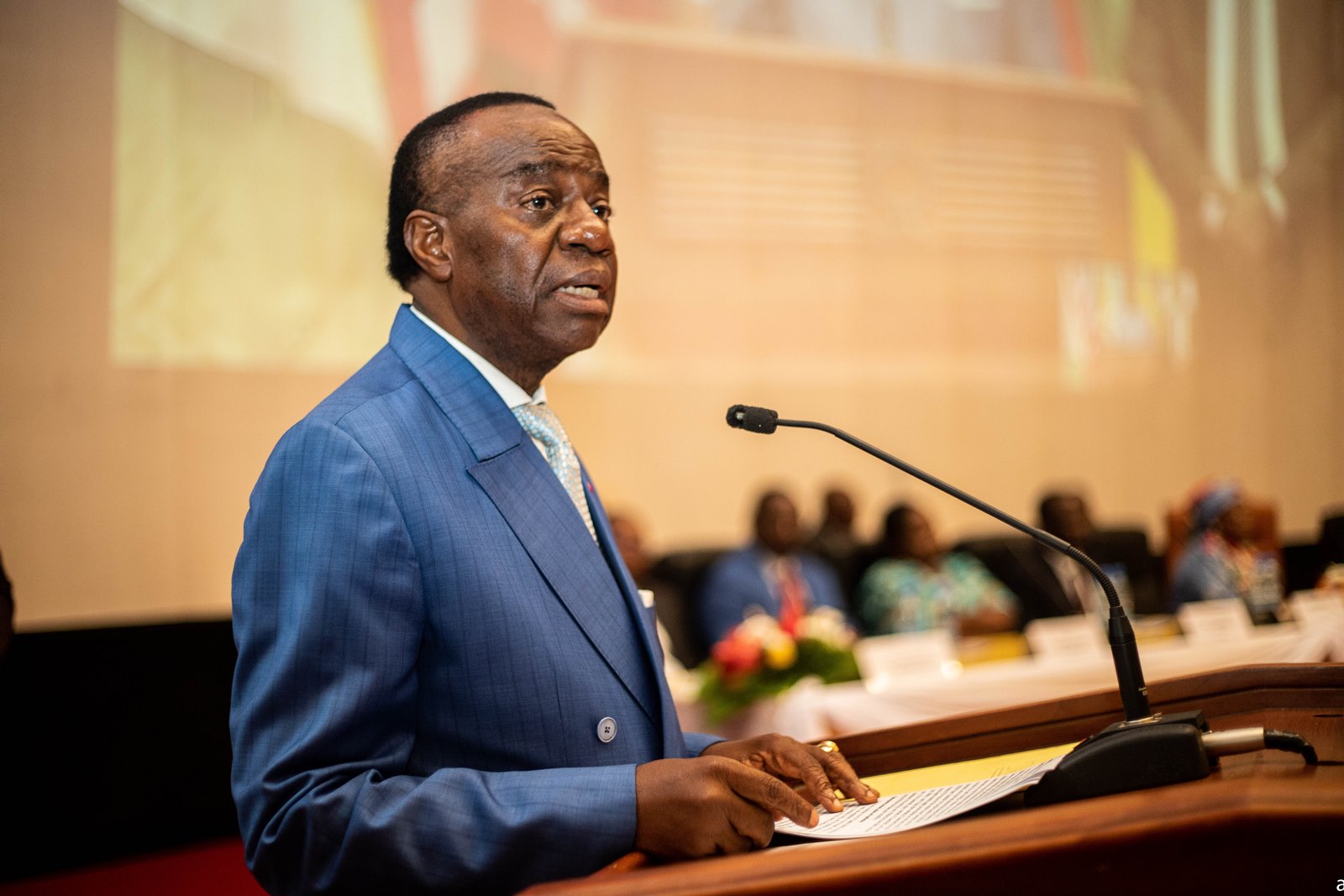
The Regional Universities Forum for Capacity Building in Agriculture (RUFORUM), a consortium of 163 universities in 40 African countries held its 19th Annual General Meeting at the Palais De Congres in Yaoundé, Cameroon from 28th October to 2nd November 2023. The first of its kind in West and Central Africa, the RUFORUM AGM 2023 provided an opportunity for over 600 delegates from Africa and beyond including; Ministers, Development Partners, University leaders, students, private sector leaders; farmers and farmer representatives; emerging and early career researchers as well as other key stakeholders in agriculture and higher education to share experiences and chart a way forward for transforming higher agricultural and tertiary education to contribute to sustainable development in Africa under the theme: Transforming Higher Education to Sustainably Feed and Create Prosperity for Africa.
Officially opened by His Excellency Paul Biya, President of the Republic of Cameroon, represented by Professor Jacques Fame Ndongo, Cameroon’s Minister of State, Minister of Higher Education, the 19th RUFORUM Annual General Meeting in Yaoundé provided a platform for participants to deliberate on key strategies for transforming higher agricultural and tertiary education to contribute to national, continental and global development as well as building consensus among key stakeholders in agriculture and higher education on the actions required to strengthen the role and/or integration of universities in agricultural and national development processes in line with the aspirations of the African Union Agenda 2063 ‘The Africa We Want’.
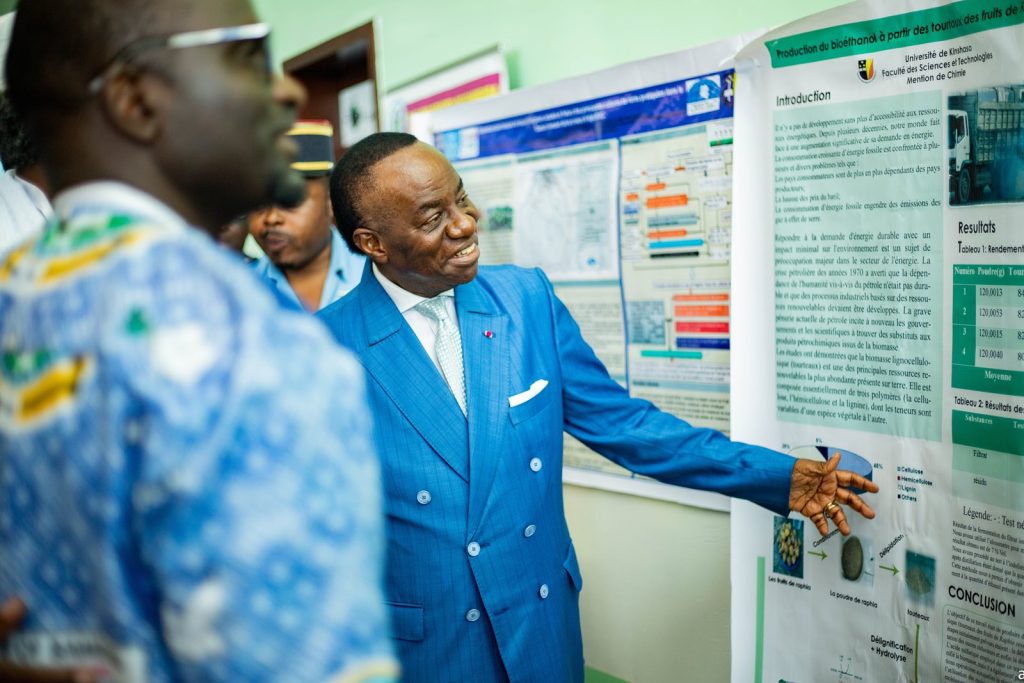
In a speech presented by Professor Jacques Fame Ndongo at the official opening ceremony, His Excellency Paul Biya, President of the Republic of Cameroon stressed RUFORUM’s significant efforts to support the African Union Agenda 2063 when he said, “RUFORUM’s vision 2030, makes the body a significant contributor to transformation of Africa and vehemently seeks to harness the discovery, engagements and learning of vibrant transformative universities to catalyze sustainable, inclusive agricultural development to feed and create prosperity for Africa.”
According to him, it is worth indicating that agriculture in Africa should be understood in its broadest sense to include but not limited to animal and crop production, livestock, wild life, fisheries and forestry. Hence RUFORUM’s mission since its inception in 2004, of strengthening the capacities of universities to foster innovation responsive to demands of small holder farmers through the training of higher quality researchers, the output of impact-oriented research and maintenance of collaborative working relations among researchers, farmers, national agricultural research institutions, the Private sector and government is worthy prioritizing.
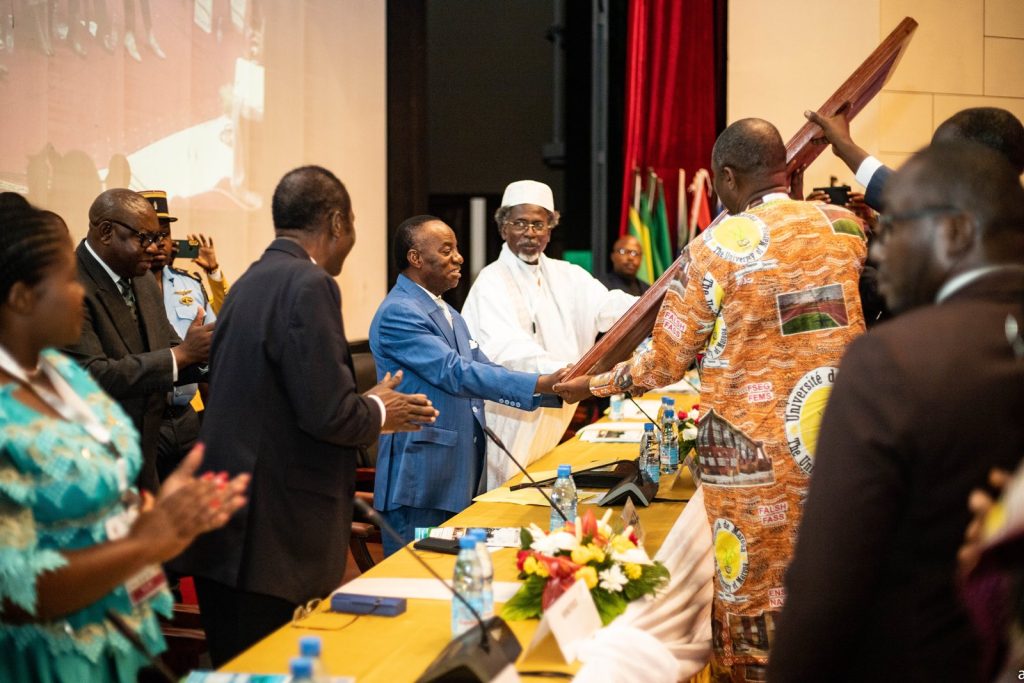
He called upon participants to use the meeting forum to change the face and image of the African continent through constructive and fruitful deliberations on agricultural production, food safety research and better health food security. To him the RUFORUM AGM is a bigger opportunity to think and act, make proposals, formulate recommendations and necessary resolutions which if acted on can change the face of the African continent.
“This is the turning point for the African continent to think big and have the courage to dream big. This is our opportunity to make a difference in our world. This is the opportunity Africa needed to change the target of its demand of action. We have to mutualize and federate our actions and voices in the interest of a united, strong and prosperous Africa,” he said.
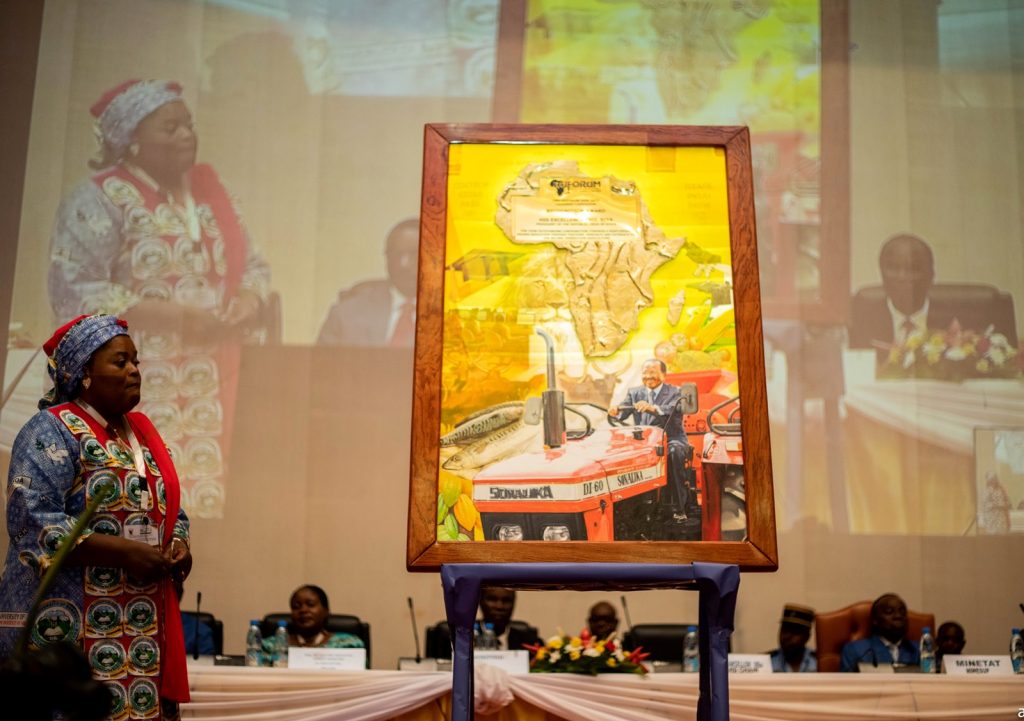
The 19th RUFORUM Annual General Meeting carried a unique vibrant turn as being the first to be held in West and Central Africa. The weeklong event broke the record as the most and well attended ever with over 600 participants across the region as well as international delegates. The colorful event was embroiled with informative, constructive, edutainment activities in form of pre-AGM events, side events, Business Meetings, capacity building and mentoring sessions, scientific conferences, poster sessions and exhibitions well aligned to key thematic areas as well as the AGM theme: Transforming Higher Education to Sustainably Feed and Create Prosperity for Africa.
Additionally, high-level policy dialogues with Ministers, Senior Government Leaders and Development Partners were held to review the finance and other resource mobilization strategies as well as following up on the actualization of the available national, regional and global policies geared towards higher education transformation and ensuring of food security in Africa.
Speaking at the Opening Ceremony, Prof. Theresia Nkuo-Akenji, the RUFORUM Board Chair and Vice Chancellor University of Bamenda thanked His Excellence Paul Biya and the Government of Cameroon for accepting to host the 19th RUFORUM Annual General Meeting and equally appreciated the financial support towards the same cause.
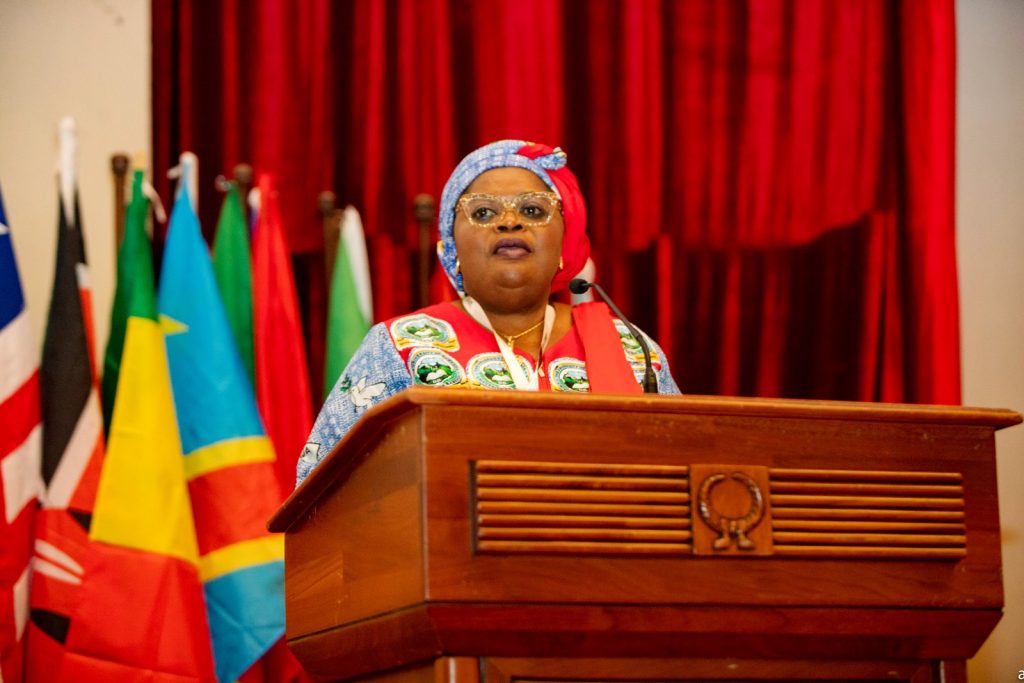
In a special way, Prof. Theresia Nkuo-Akenji thanked the Ministry of State for Higher education and all the sister ministries of Government of Cameroon that worked hard to see to it that the 19th RUFORUM AGM is a success. Equally, the Board Chair, extended her sincere gratitude to the people of Cameroon for the warm reception and support.
“My special tribute goes to the members of AGM 2023 Sub committees. You have indeed done a great job throughout the ten months of organizing this significant event. On behalf of RUFORUM Network, I thank you. To the RUFORUM Secretariat under the dynamic leadership of Prof. Patrick Okwori, accept our immense gratitude for your strong determination and dedication,” she gratefully said.
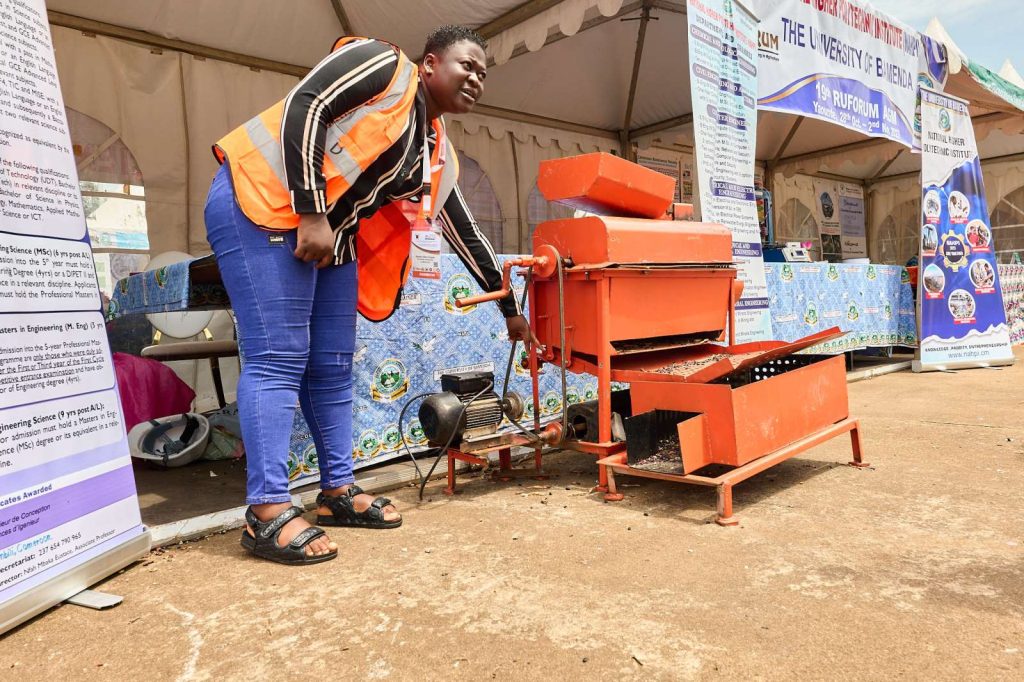
She recognized the tremendous achievements and developments aligned to RUFORUM’s nineteen years (19) of existence noting that the strong network has wisely selected its priority areas of focus to transform higher education and agricultural sector in Africa as;
- Reform the training agenda for Africa to meet the development needs
- Entrepreneurship and business incubation for wealth creation
- Research for Development and wealth creation
- Partnerships for scale and impact
“As African people, permit me to use the adage of a broom; it is easy to break a single broom piece but when you combine several small brooms together they then make a broom stack that will not be easy to break. The collective power that RUFORUM has put together through 163 universities from across 40 countries bears such strength. The Vice Chancellors gathered here today remain committed to the core values and foundations of the network. To illustrate this Your Excellency, each of the Vice Chancellors meet their own costs of participation.” She happy said.
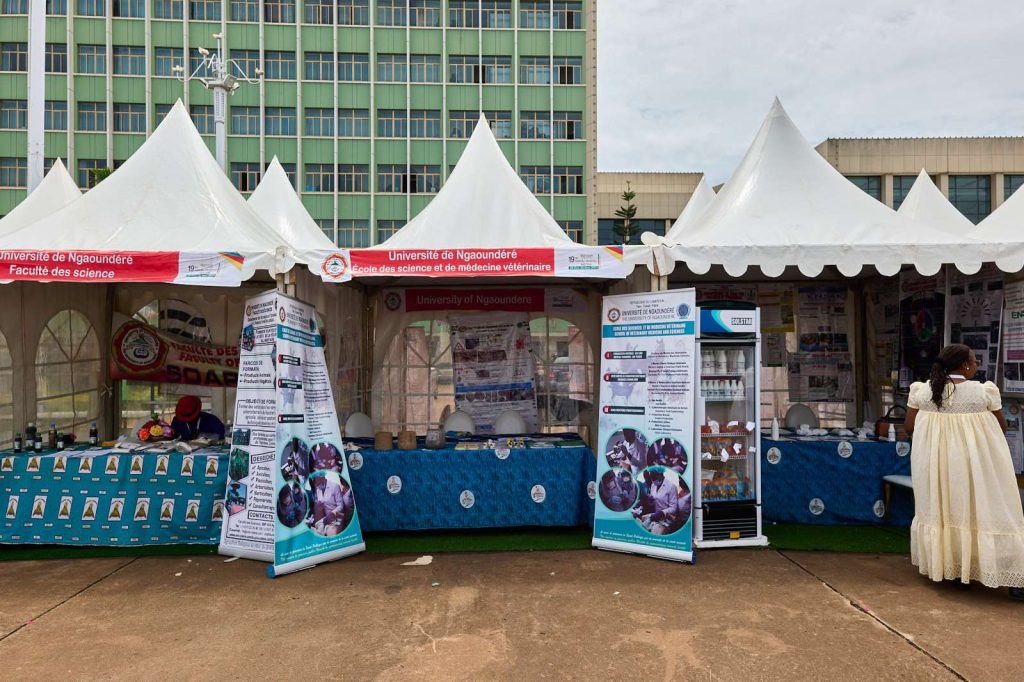
In the same spirit the RUFORUM Executive Secretary Prof. Patrick Okori deeply thanked the host Universities that is, University of Bamenda, University of Ngaoundere, University of Dschang, University of Buea and University of Maroua under the strong and able leadership of the RUFORUM Board Chair, Prof. Theresia Nkuo-Akenji for successfully hosting the 19th RUFORUM Annual General Meeting.
He also recognized the Former Vice Chancellor of University of Ngaoundere Prof. Florence Uphie Chinje Melo who heavily supported the AGM preparations. He was astonished with the presence of the Africa Development Bank, MasterCard Foundation, research international communities, RUFORUM for Agricultural Research in Africa, the Africa Forum for Agricultural Advisory Services, sub regional Agricultural organizations such as the Association for Strengthening Agricultural Research in Eastern and Central Africa (ASARECA), the Centre for Coordination of Agricultural Research and Development for Southern Africa (CCARDESA) and the West and Central African Council for Agricultural Research and Development (CORAF).
“You have all provided support for this engagement, thank you very much. Together we will continue this journey of transforming Africa’s Agricultural and higher education to produce human resources and development solutions that Africa and indeed the world needs,” he said.
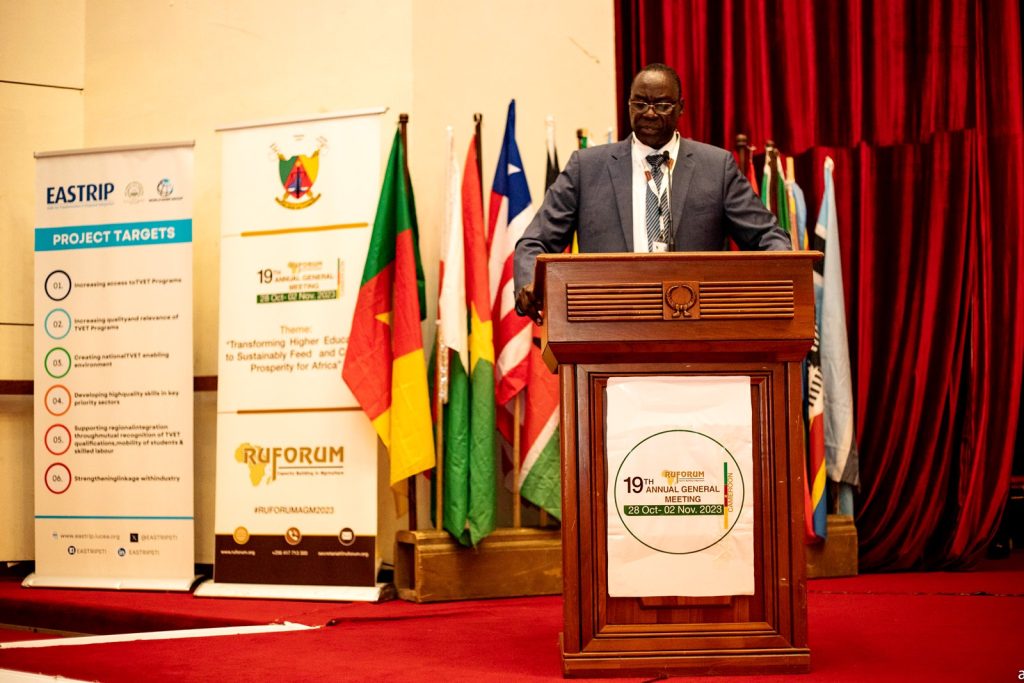
Reflecting on the AGM’s theme, Prof. Okori emphasized the need for Africa to become food secure when he said, “Africa must be an equal opportunity creator for the young generation, it must create wealth for its people and provide opportunities for the present and future and these are well summarized in agenda 2063. It is our collective duty therefore to turn these opportunities and actions into investment.”
According to him, the RUFORUM Network remains strong in building capacity and providing the necessary development solutions and opportunities. He noted that Africa generates about 10-12 million job entrants annually but the continent’s economy in its current configuration can only produce 3 million jobs. To him, for Africa to therefore reap from its demographic dividends, there is need to strengthen the paths to demographic transition of keeping young girls in school.
Prof. Okori also mentioned that RUFORUM is currently intensifying its inclusion and diversity targets. From 45%, the network has an ambitious target of at least 70%. “We must slow the rate at which girls give birth when young. It is the only way we are going to benefit from our population dividend,” he said.
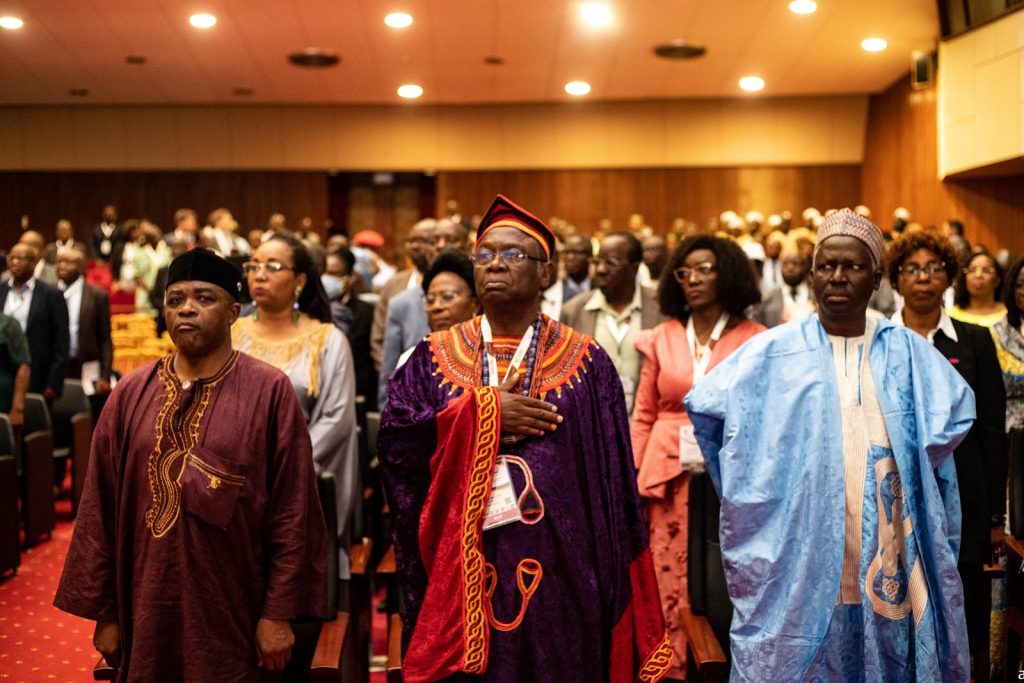
According to him, the higher degree needs for Africa is pretty dire. The World Bank recommends 10,000 PhDs to Africa. This can be compared to India whose signal population of 1. 4 billion registers 24000 PhDs a year. The pressure therefore on Africa’s side to intensify graduate training is real.
“Our graduate training in sciences therefore is one of the drivers to achieve this and it is the immense reason as to why in this meeting we have social and development partners. We are launching a journey with the Africa Development Bank that will bring us together as apex organizations in Africa to work together and solve our own challenges. However, as we do all these, we need to celebrate Africa. We should be recognizing and celebrating people who made what Africa is today,” he said.
Africa is informed by a number of important mutually interacting factors that collectively, are affecting the growth and progress of the continent. The economic outlook of the African continent in 2023 by the African Development Bank and other global apex development financial institutions was positive. However, Africa’s economic growth has since then decelerated, and is now projected to be lower than the previously projected rate of 4.1%.
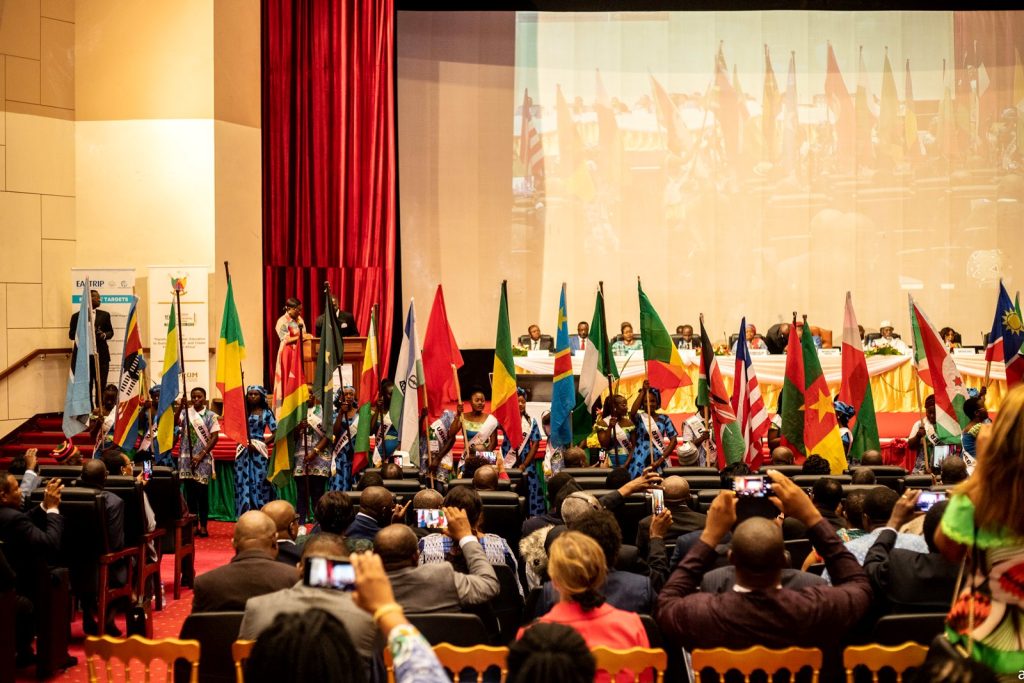
Agriculture a key sector, continues to be affected by both natural and human induced factors. It continues to face serious threats from climate. Studies by the United Nation’s Convention to Combat Desertification show that Africa accounts for 44% of severe droughts recorded globally in the last 50 years, causing economic losses of more than USD 70 billion. In 2022, an estimated loss of US$ 8.5 billion in economic damages was experienced due to climate change. Clearly, climate change and weather variability, remains one of the grand challenges of the 21st century for Africa and the World, because it affects key livelihood and strategic areas of emerging economies.
Unemployment facing Africa’s dominant demographic-the youth, raises questions about education, skilling and jobs creation while inclusion and diversity, the underpinning for an equal society, remains challenging. The question then to academia, researchers, development practitioners and policymakers is, “what step must we take right now to address the challenges to our current and future generations?”
“Our resounding response as RUFORUM is in line with what Malcolm X said many years ago, “Education and research for development are the passports to the future, for tomorrow belongs to those who prepare for it today,” said Prof. Partick Okori.
According to the Deputy Minister for Education in Malawi, Her Excellence Mdooko Nancy Chawola who represented the visiting ministers of RUFORUM partner countries, African countries should put in place vibrant resource mobilization mechanisms to collectively finance Africa’s education and support governments that are battling with competitive budgetary demands.
“For the universities to offer solutions for the challenges the continent is facing, there is need to rebuild the curriculum that responds to our current needs and not what we needed yesterday. Our respective countries are grappling with higher levels of unemployment, can investors assist by producing graduates with entrepreneurial skills so that they are able to employ themselves and others. Of course there will be need to put in place support mechanism for such graduates to take over,” she said.
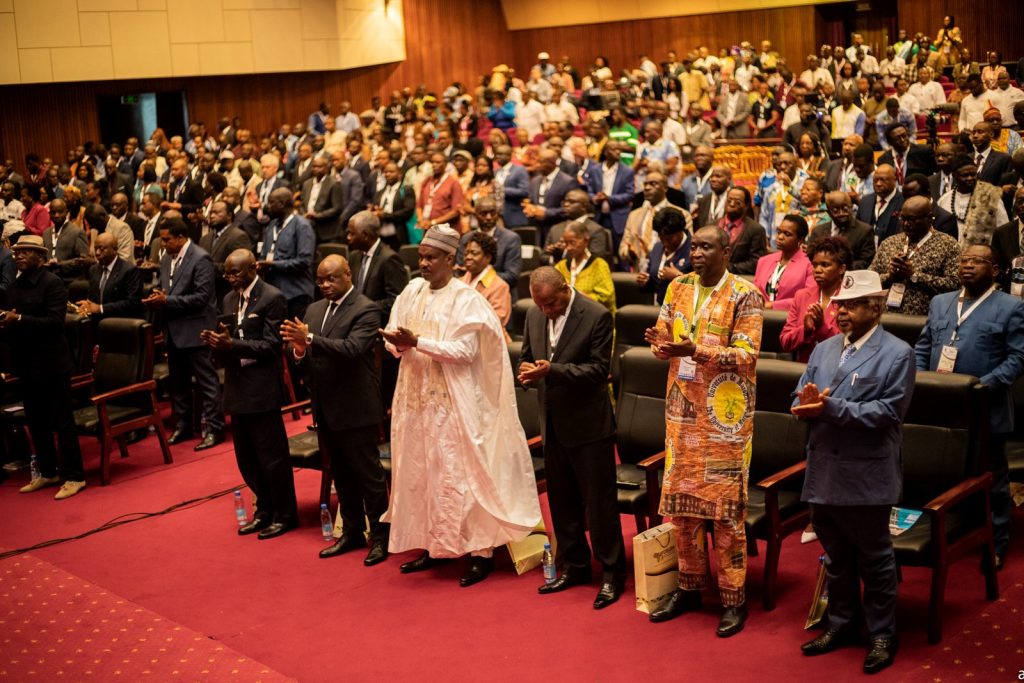
She equally acknowledged the national regulatory frameworks such as the Malawi Regulation Framework 2063 developed inline with the African Union Agenda 2063 the Africa we want, in which the continent aspires to be prosperous by 2063 through various means such as modernizing agricultural for increased production and productivity there by making people food secure.
She applauded RUFORUM’s efforts towards zero hunger in Africa through its vision 2030. According to Mdooko Nancy Chawola, food security is supposed be prerogative as well highlighted in the Sustainable Development Goal 2 (SDG 2) that is geared towards ending hunger, attaining food security, improving nutrition and promoting sustainable development.
In Cameroon, Agriculture and Education have been prioritized as drivers for economic growth and transformation. Through an agricultural flagship program initiated by His Excellence Paul Biya, science programmes and financial services as well as favorable ways of accessing market have been introduced in the country with the aim of transforming agricultural sector into a value added industrialized and integrated system engine of economic growth.
According to Prof. Ngomo Horace Manga- Vice Chancellor, University Buea, the government of Cameroon has resolved to grant its people with education that can help them manage their personal, national and Africa’s present and future economic destiny. In 2022, His excellence Paul Biya endorsed the recruitment process of 2000 lecturers in universities to ensure the quality of higher education in Cameroon.
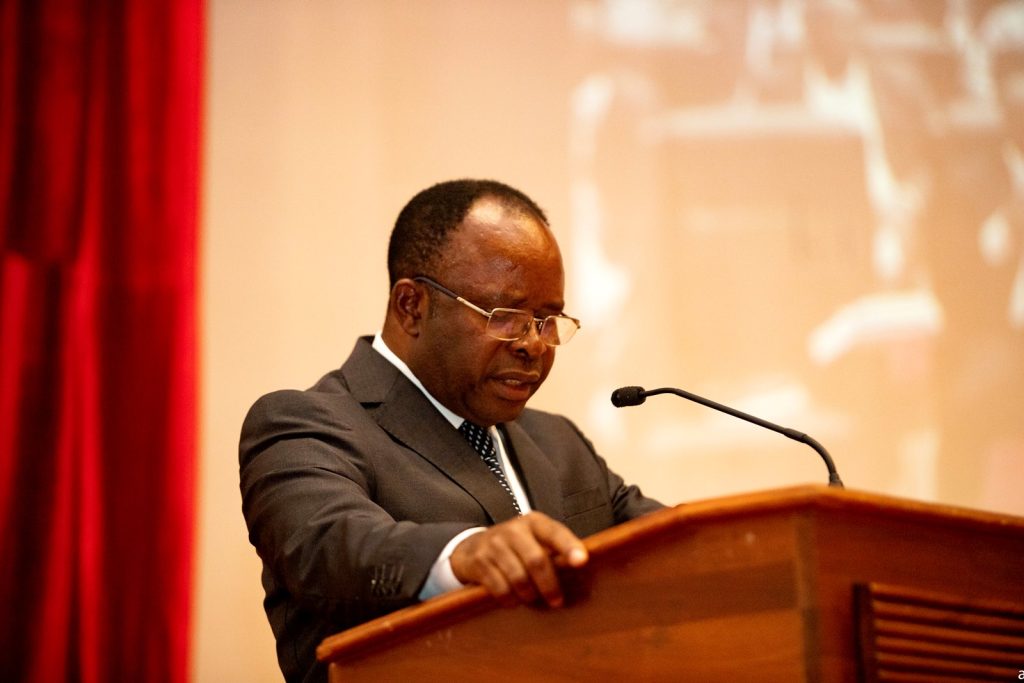
“Collectively these education reforms and investment actions affordably can transform the people of Cameroon into a strong emerging market. Cameroon carries the highest science female adoptive rate in sub-Saharan Africa at 73%. This is a strong result of government delivery of United Nations SDG 5 of achieving education and build human capital for the country,” he noted.
The Opening Ceremony for the 19th RUFORUM Annual General Meeting unlocked the floor for critical discussions and meetings throughout the week. At the same function, RUFORUM presented a contemporary painting to His Excellence Paul Biya, President of the United Republic of Cameroon in recognition of his outstanding, selfless and patriotic services s to the people of Cameroon and Africa at large.
On 25th October 2023, the RUFORUM Network equally participated in the Cameroon Higher Education Day, the first of its kind in the country.
You may like
-


EfD-Mak Holds 2nd Advisory Board Meeting: Charts Path for Growth
-
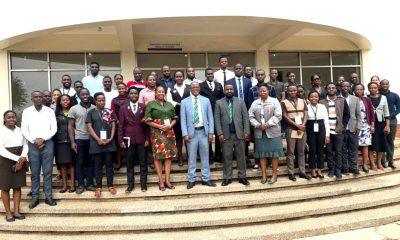

Mak Moves to Revitalize Food Technology & Business Incubation Centre to Drive Innovation & Entrepreneurship
-
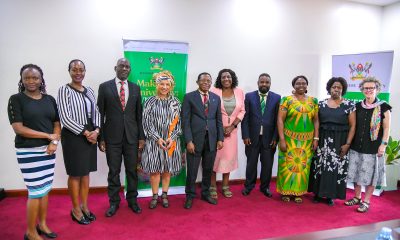

Mak, HERS-EA Discuss Nurturing More Women Leaders
-


Press Statement on Ranking
-
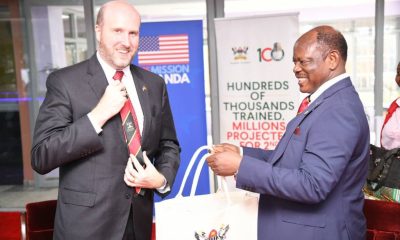

Happy Independence Day, America
-
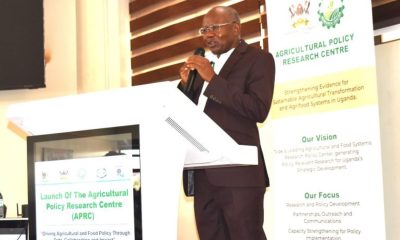

APRC Trains Graduate Students & Stakeholders in the Use of the African Agriculture Adaptation Atlas
General
Simplicity, Service & Scholarship: Hallmarks of Professor Livingstone Luboobi’s Legacy
Published
9 hours agoon
July 18, 2025By
Eve Nakyanzi
On Wednesday 16th July 2025, Makerere University lost one of its most cherished sons, Professor Livingstone Sserwadda Luboobi. Described as a mathematician, academic leader, and humble servant, Professor Luboobi devoted more than five decades to the university, rising through the ranks to become Vice Chancellor, and leaving a legacy defined by simplicity, service, and scholarship.
Born to Lameka Serwadda and Sanyu Serwadda on 25th December 1944 in Mitondo, Kalisizo, Kyotera District, Professor Luboobi’s academic career begun as a third-year student at Makerere and continued with unwavering loyalty until his passing. His life’s work reflected not only a commitment to mathematics but also nurturing generations of scholars and leaders across Uganda and beyond.
A funeral service was held in his honour at St. Francis Chapel, Makerere University on 18th July 2025. It was a moment of solemn remembrance and heartfelt tribute. Rev. Canon Dr. John Senyonyi delivered the sermon titled “Only God Knows,” reminding mourners of the mystery and grace of life’s journey. Rev. Canon Geoffrey Byarugaba represented the Kampala Diocese at the service, while former St. Francis Chaplain, Rev. Dr. Canon Johnson Ebong thanked Professor Luboobi for spearheading the Chapel’s expansion. Friends, colleagues, and family members filled the chapel, joined in mourning but also in gratitude for a life that had deeply touched theirs.

Mrs. Lorna Magara, Chairperson of the University Council, spoke movingly about Professor Luboobi’s faithfulness, likening his life to the biblical call in Mark 10:43, “Whoever wants to become great among you must be your servant.”
In his condolence message, the Vice Chancellor, Professor Barnabas Nawangwe, hailed Professor Luboobi as a visionary leader whose legacy is deeply woven into Makerere’s identity as a research-led institution. He credited Professor Luboobi with laying the groundwork for a culture of inquiry—championing graduate programmes, encouraging doctoral training, and fostering international collaborations that strengthened the university’s research profile. “He believed in building systems, not just structures,” noting that many of Makerere’s current research policies stem from his leadership. Even in retirement, Professor Luboobi remained a source of wisdom and guidance, quietly shaping the future of the university he so deeply loved.
Speaker after speaker painted a portrait of a man who led not by pomp, but by quiet strength and deep conviction. The Principal, Professor Winston Tumps Ireeta, speaking on behalf of the College of Natural Sciences (CoNAS), described Professor Luboobi as a foundational figure whose influence is deeply etched in the structures and spirit of the college. He spoke with emotion about Luboobi’s unwavering commitment to academic integrity and his belief in the power of mentorship.

“He was not just a mathematician,” Professor Ireeta said, “he was a visionary who understood the soul of the university. Even in retirement, he remained an advisor, a guide, and a quiet force of wisdom.” He concluded by saying that the college would continue to draw from his example as it navigates the future of science and innovation in Uganda.
Professor Luboobi’s illustrious career at Makerere University included serving as Head, Department of Mathematics from 1990 to 1991. The current Head of Department, Dr. Ismail Mirumbe remembered him as a pillar in the teaching and development of mathematics in Uganda
Professor John Mango, who served as Head, Department of Mathematics during Professor Luboobi’s term as Vice Chancellor from 2004 to 2009 described him as a towering figure of integrity and principle, someone who not only upheld the highest standards of academic conduct but insisted that others around him do the same. “He was a pillar in the department,” Prof. Mango remarked, “and his moral compass was unwavering.”

He recalled instances where Professor Luboobi made firm decisions, including terminating contracts when integrity was compromised, setting a tone that shaped the department’s reputation for honesty and excellence. Even as Vice Chancellor, he remained deeply involved in the department’s affairs, teaching, supervising students, all the while handling top administrative duties punctually. Prof. Mango spoke with great admiration of a man who led by example, mentored many, and whose contributions to mathematics education, research, and policy-making continue to shape the future of the discipline in Uganda and beyond.
According to an article from 1990 written by Dr. Vincent Ssembatya and Andrew Vince at the University of Florida, the Uganda Mathematical Society (UMS), which was formally established on 25th November, 1972 has since inception enjoyed major support from Makerere University and Kyambogo University in terms of infrastructure and leadership. Professor Paul Mugambi, who was also present at Professor Luboobi’s funeral service was elected first president of the UMS. Dr. Saul Nsubuga from the Department of Mathematics represented UMS at the service, honouring Professor Luboobi’s pioneering role in the discipline.
The service also featured tributes from close friends and family. Loved ones shared stories of a man who remained grounded no matter how high he rose, a man who valued relationships and walked closely with his faith. His children and grandchildren remembered him as a father who was ever-present, a listener, and a source of steady guidance.

Professor Daniel Kibuule, son of the late Professor Luboobi and Dean, Faculty of Health Sciences at Busitema University, delivered a deeply personal tribute that painted a full portrait of his father’s life, values, and final days. He expressed gratitude to the University leadership, family, friends, and medical professionals who stood with them during a challenging period. He particularly thanked his siblings, Dr. David Kimera and Dr. Irene Nakiyimba for their unwavering role in caring for Professor Luboobi through illness.
He spoke of a man who, despite great academic accolades, remained deeply humble and committed to discipline, simplicity, and faith. From instilling punctuality and responsibility to ensuring his children charted their own paths, none bearing his surname “Luboobi”, Prof. Luboobi was intentional in every lesson he passed on. Kibuule recalled his father’s insistence on being at home even in his final moments, his strong connection to Christ, and his quiet strength despite his failing health.
Former students and mentees echoed the same sentiments, of a teacher who was generous with his time and invested deeply in others’ growth. The community that gathered was not only there to grieve but to celebrate the quiet legacy of a man whose example continues to live on.
Among the mourners were public figures and leaders, including Hon. Abed Bwanika, Member of Parliament for Kimanya-Kabonera, Hon. Nyombi Thembo, the Executive Director Uganda Communications Commission, and Hon. Dr. Ham-Mukasa Mulira, former Minister of ICT, among others.
In his passing, Makerere University has lost a pillar, but his life reminds us that greatness lies in consistency, in humility, and in service to others. Professor Luboobi’s memory will continue to live on in the minds he shaped, the systems he built, and the values he embodied. He ran his race with grace.
The Writer is a Volunteer in the Public Relations Office, Makerere University
Please click the embedded video below to view the service livestream
General
Public University Legal and Accounting Officers Trained on Governance and Compliance
Published
2 days agoon
July 17, 2025By
Eve Nakyanzi
Legal and accounting officers from public universities across Uganda have convened, for a high-level training workshop organized by Makerere University. The three-day training, taking place from July 16th to 18th, 2025, is aimed at strengthening legal frameworks, improving institutional governance, and ensuring compliance with public finance and procurement laws within higher education institutions.
Ms. Lorna Magara, Chairperson of the Makerere University Council and Guest of Honour at the opening session, commended the initiative as timely and necessary. She addressed the growing backlog of court cases affecting Makerere and other public universities and outlined measures already taken to mitigate legal risks. These include the establishment of a Legal Rules and Privileges Committee and the Directorate of Legal Affairs, part of a broader strategy to improve legal compliance and foster good governance.
Representing the Vice Chancellor, Prof. Winston Tumps – Ag. Deputy Vice Chancellor (Finance and Administration), described the training as both strategic and practical. “It is imperative that we learn from each other, especially in how we handle employee litigation and institutional legal risks,” he remarked. He added that the program is designed to promote experience-sharing across universities and enhance collective institutional growth.

In his address, Mr. Yusuf Kiranda, University Secretary at Makerere University, emphasized the urgent need for robust legal oversight and more effective case management mechanisms within public universities.
The training featured a keynote address by the Attorney General of Uganda, Hon. Kiryowa Kiwanuka, who provided critical insights into legal expectations for public institutions. He warned that failure to heed legal advice could result in personal liability for accounting officers, citing a precedent involving the Uganda Cancer Institute. “Universities must consult the Attorney General’s chambers before entering into major contractual obligations,” he advised, urging legal officers to document decisions meticulously as proper record-keeping forms the first line of defense in legal disputes.

Hon. Kiwanuka further discussed the government’s ongoing efforts to recentralize legal services to ensure alignment with the Attorney General’s office. He cautioned in-house counsel against becoming overly entangled in decision-making processes, stressing the need for objectivity. Other key issues he addressed included contract approvals, misuse of Memoranda of Understanding (MoUs), and lapses in procurement processes, particularly at the close of financial years.
Participants also benefited from insights by Hon. Justice Musa Ssekaana of the Court of Appeal, who offered an in-depth analysis of judicial review and its significance in promoting lawful, transparent university governance. He called on university legal officers to act with clarity, timeliness, and accountability.
Lady Justice Joyce Kavuma, Judge of the High Court, delivered a comprehensive presentation on dispute and claim management involving public universities. She addressed emerging trends in civil litigation, emphasizing the importance of due process, transparency, and clear communication in resolving employment, student, and contractual disputes. Drawing on real case examples, she urged institutions to strengthen internal systems, embrace participatory governance, and adopt regional best practices to minimize litigation and protect institutional reputation.

The training reflects a shared commitment among public universities to build a more accountable, legally sound, and strategically aligned higher education system in Uganda. Through peer learning and collaboration, participating institutions aim to reduce litigation, enhance institutional autonomy, and uphold the rule of law.
Participating universities include Makerere University, Kyambogo University, Mbarara University of Science and Technology, Busitema University, Mountains of the Moon University, and Lira University.
The training concludes on July 18th 2025, with sessions focusing on employment dispute management in public universities and the implications of recent PPDA Appeals Tribunal decisions on procurement and disposal practices within public entities.
General
Celebrating the Life of Prof. Livingstone Sserwadda Luboobi
Published
2 days agoon
July 17, 2025By
Mak Editor
A Visionary Leader, Seasoned Mathematician, & Humble Academician
It is with profound love and respect that we celebrate the life of Prof. Livingstone Sserwadda Luboobi, a distinguished scholar, transformative leader, and beloved Vice Chancellor Emeritus of Makerere University. His legacy is woven in the fabric of African higher education, marked by intellectual brilliance, unwavering commitment to academic excellence, and a life of selfless service.
A Life of Purpose and Vision
Prof. Luboobi was more than a mathematician. He was a visionary, whose work transcended equations and research papers. Serving as Vice Chancellor from 2004 to 2009, he led Makerere University through a critical period of growth and transformation. Under his guidance, the university expanded its reach, strengthened its academic rigor, and embraced innovation and reform. His calm demeanour and principled decision-making earned the admiration of students, faculty, and peers alike.
Prof. Luboobi was deeply committed to nurturing talent and fostering intellectual curiosity, leaving an indelible mark on the institution’s culture and future direction.
Beyond Uganda, Prof. Luboobi’s influence resonated across the global academic community. He was a passionate advocate for the transformative power of science and education, often speaking at international forums and collaborating on research that bridged continents and disciplines. His work helped elevate the profile of African scholarship on the world stage.
His legacy endures not only in the impressive body of work he left behind but also in the countless lives he touched – students, educators, and leaders who continue to draw inspiration from him.
Academic and Leadership Journey at Makerere University
An illustrious alumnus of Makerere University, Prof. Luboobi graduated with First Class Honours in Mathematics, laying the foundation for an extraordinary academic journey. He pursued further studies at the University of Toronto (MSc in Operations Research, 1971-72) and the University of Adelaide (PhD in Biomathematics, 1978–80). His scholarly journey spanned prestigious institutions worldwide, including UCLA, the University of Bergen, and the University of Dar es Salaam, establishing him as a scholar of global repute and a proud ambassador of African intellectualism.
Prof. Luboobi’s service to Makerere begun in 1970 as a Special Assistant-remarkably, while still an undergraduate, rising through the ranks to full Professor in 1997. He served as Head of Department, Dean of the Faculty of Science (1994–2001), and later became the university’s first elected Vice Chancellor. His tenure brought new energy to institutional leadership, characterized by transparency, inclusivity, strategic direction and accountability.
Strategic Reforms and Institutional Impact
A true architect of transformation, Prof. Luboobi chaired the development of Makerere’s first locally-conceived Strategic Plan (1990–91). He was instrumental in securing a UGX30 billion grant from NORAD in 1999, which revitalized key academic areas such as computing, gender studies, and food science. He co-founded the Makerere University Private Sector Forum, bridging the gap between academia and industry, and strengthening alumni engagement and resource mobilization.
Pioneering Biomathematics and Mentorship
As one of Africa’s pioneering biomathematicians, Prof. Luboobi introduced mathematical modeling to tackle real-world problems in epidemiology, ecology, and operations research. His scholarly contributions – over 150 publications – reflect the depth and breadth of his research. Yet, perhaps his most lasting impact lies in mentorship: he supervised more than 35 PhD and over 50 MSc students, including Makerere’s first female PhD graduate in Mathematics, nurturing a generation of scholars and leaders.
Prof. Luboobi’s Contribution to the Internationalization of Makerere University
Prof. Luboobi played a pivotal role in advancing the international profile of Makerere University. Demonstrating remarkable personal commitment, he utilized his own resources to support the establishment of the University’s International Office. This strategic initiative laid the foundation for a more structured and effective engagement with global academic institutions, development partners, and international students. As a result, Makerere University significantly enhanced its global footprint, forming numerous international collaborations and attracting increased academic and research opportunities from abroad.
In addition to his contributions to internationalization, Prof. Luboobi was also instrumental in revitalizing the University’s Public Relations Unit. Under his guidance, the unit adopted more proactive and professional communication strategies, which greatly improved the institution’s public image. This, in turn, fostered greater public trust and strengthened the university’s reputation both locally and internationally. His visionary leadership in these areas has had a lasting impact, positioning Makerere University as a leading institution in East Africa and beyond.
Global Recognition and Enduring Legacy
Prof. Luboobi’s contributions earned him widespread recognition. In 2008, the University of Bergen awarded him an Honorary Doctorate for his role in internationalizing academia. Makerere University honoured him with a Lifetime Achievement Award in 2013, and the Government of Uganda conferred upon him a National Gold Medal for his unwavering service to education and national development.
Even after retirement, Prof. Luboobi remained an active contributor to academic life-lecturing, supervising, and advising the university.
A Lasting Light in African Academia
Prof. Livingstone Sserwadda Luboobi’s life was a model of scholarship anchored in service, leadership tempered with humility, and an unshakable belief in the power of education. He leaves behind a vibrant academic legacy and a trail of inspired minds. His contributions will continue to shape Makerere University, Uganda, and the global academic community for generations to come.
We extend our heartfelt condolences to his family, colleagues, and the entire Makerere University community during this difficult time.
May his soul rest in eternal peace.
Trending
-

 General2 weeks ago
General2 weeks agoRe-advert: Admission to Undergraduate Programmes 2025/2026
-

 General1 week ago
General1 week agoRe-Advert for Applications for Diploma and Certificate Training
-

 General5 days ago
General5 days agoMakerere University Fees Waiver for 40 First Year Female Students 2025/2026
-

 General2 weeks ago
General2 weeks agoPress Statement on Ranking
-

 Health1 week ago
Health1 week agoCall for Applications: Responsible Conduct of Research (RCR) Training Course
